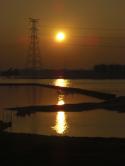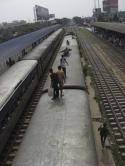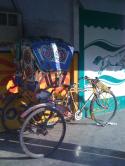Shooting Diary
Phase 4: Bangladesh
After the wide countryside of Mali, with 10 people per 10 km2, Bangladesh with its 1066 inhabitants per km2 was quite a different thing. The capital, Dhaka, greets the visitor with a lot of noise – from rikshas, from cars, from small tuk-tuk cabs, from cows, and above all from thousands of Bangladeshi. A bustle that, however, did not stop us from quickly visiting the headquarters of Grameen Bank to meet our protagonists from Bangladesh.
Grameen Bank is one of the largest financial institutes of the world, founded by Nobel Peace Prize Laureate Muhammad Yunus. Grameen has given micro-credits with a total value of 6.55 billion dollars to over 7 million people, 97% of which are women. The headquarters, towering high above Dhaka, demonstrate the size and influence of Grameen Group, which has extented its holistic business concept to all important fields of life with subsidiary companies such as Grameen Phone (communication), Grameen Check (clothing), Grameen Danone (food) and Grameen Shakti (energy).
We had the honour to meet the founder in person and have a moving interview with him on poverty, justice, and energy autonomy. We got to know Prof. Yunus in his professional environment as a perfectly organized, extremely friendly and modest manager, and as one of the greatest visionary characters of this 21st century.
Every great visionary leader needs an assistant for every-day operative work, a person to turn the vision into reality. This person is Dipal Barua, CEO of Grameen Shakti, the energy section of Grameen. Barua has dedicated himself to eventually supplying all of Bangladesh with renewable energy – an important step in the fight against poverty. In contrast to the Mali Folke Center, where a similar development has just begun, the project in Bangladesh is already in an advanced stage. Instead of money, Grameen Shakti loans out solar home systems or small biogas stations. The loans are paid back from the returns of improved business conditions. In this way, Barua has already brought green energy to several million Bangladeshi – and he is aiming for 75 million people by 2015. This would also create 2 million jobs, mostly for women. In order to understand Barua's vision, we accompanied him to the countryside – away from all the noise, into an idyllic and even more colourful Bangladesh.
We visited training stations where women learn how to weld together a solar home system on their own, in order to become more independent. All parts except for the photovoltaics modules themselves are produced within Bangladesh.
We visited farms with biogas stations, which solve the problems of a whole village in one go: no more stench, and energy is reliably available at all times.
Apart from this perfect organization, we made contact with women for the first time: Normally, they are hardly ever seen in public. Barua has created an infrastructure where women can express themselves, study, teach others – like a perpetuum mobile. Surely a revolution for Bangladesh, for energy, and for women.























